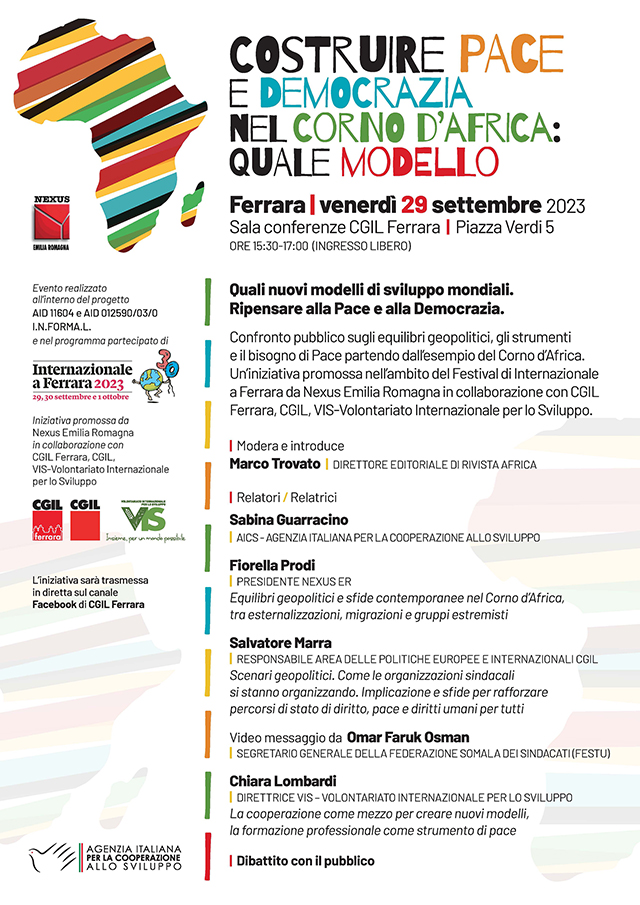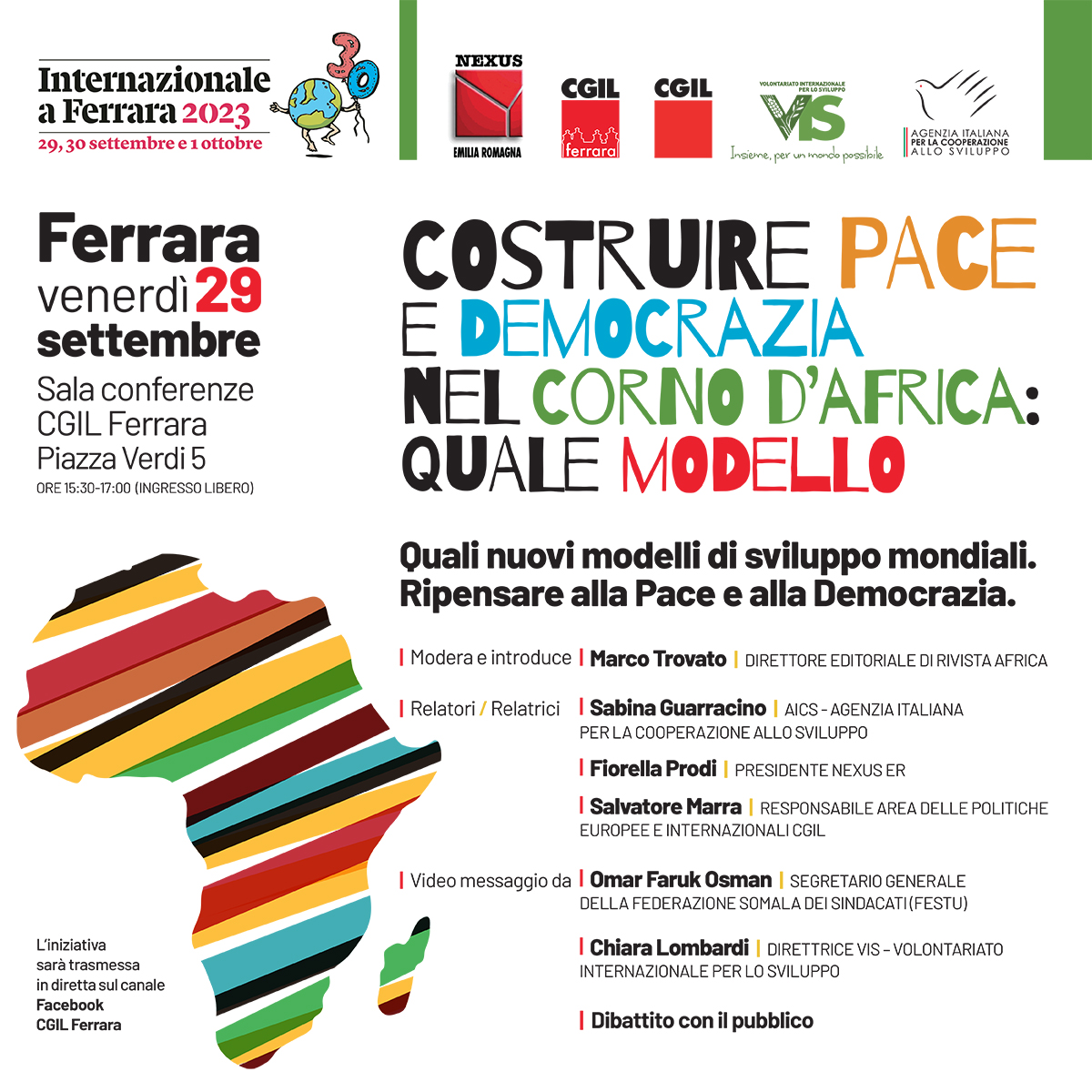29 September 2023, Ferrara
 After the information seminar "Decent work, professional training and peace in the Horn of Africa" - organized on 14 March at the Chamber of Labor ER in Bologna - on 29 September we returned to talk about Eritrea and Somalia at the Chamber of Labor in Ferrara: a further moment of reflection and discussion organized as part of projects financed by AICS Italian Agency for Development Cooperation and implemented by Nexus ER in the Horn of Africa region, in particular in Somalia and Eritrea.
After the information seminar "Decent work, professional training and peace in the Horn of Africa" - organized on 14 March at the Chamber of Labor ER in Bologna - on 29 September we returned to talk about Eritrea and Somalia at the Chamber of Labor in Ferrara: a further moment of reflection and discussion organized as part of projects financed by AICS Italian Agency for Development Cooperation and implemented by Nexus ER in the Horn of Africa region, in particular in Somalia and Eritrea.
A further moment of reflection that allowed the public to reflect on the mutual impact that the different development processes underway in the states of the region have at a political, social and economic level, their interdependence in the global scenario, and the crucial role of trade unions in the processes of social dialogue and, therefore, in democratization processes.
And it is precisely thanks to the promotion of social dialogue, promoted by cooperation that it is possible to talk about the Horn of Africa in an "unusual" way, as Marco Trovato, editorial director of Africa Rivista, states at the beginning: a region generally associated with humanitarian crises, devastation , wars and conflicts, but where at the same time there is a lively civil society that aspires to acquire civil rights at work and individual freedoms on which international cooperation is based.
The central role of cooperation for the achievement of labor rights, peace and democracy is the main theme of the speech by Sabinia Guarracino of the Italian Agency for Development Cooperation (AICS), who opens the meeting starting from the Somali situation :
«One of the most important, complex and decisive sectors for the country is that linked to objective 16 of the 2030 agenda: building and promoting peace, stability and the rule of law; ambitious targets on which Italian cooperation does not hold back. Nexus Emilia Romagna and its network of partners thanks to the “INFORMA.L. – Educate, Standardize, TRAIN, Work. From informal to formal for inclusive growth, peace and social dialogue in Somalia AID 012590/03/0" have the objective of creating decent work for women and men, promoting social dialogue and peace"
Salvatore Marra, responsible for European and international policies of the CGIL, continues the dialogue with the public by developing one of the central points of the seminar: the role of the world of work and the promotion of workers' rights as a driver of social dialogue and the democratization of the country : «The construction of a democracy has never happened without the participation of the world of work. CGIL and the international cooperation institute, Nexus Emilia Romagna, eschewing a neocolonial logic, make available skills, knowledge and resources, including economic ones, to support the realities of local civil society, without replacing them in their journey. Thanks to the construction of partnership networks, social dialogue is promoted, in particular in the workplace, thus encouraging democratic processes".
In this regard – states Salvatore Marras – it is important to underline the importance of analyzing the context and, based on it, building ad hoc action to achieve union gains. The trade unions that exist in the countries of the Horn of Africa, for example, are different from each other and, therefore, have requested and require specific projects and processes: there cannot be pre-established measures that do not take into account the political context and social and historical process underway in each individual country.
In Somalia, for example, Nexus Emilia Romagna began a journey alongside the local union years ago: we went from a phase in which we fought for the union to be recognized by political forces, to a phase, the current one, in which we participate together to the union, to dialogue with institutions to get workers out of the informal economy (INFORMA.L. project https://somaliainformal.nexusemiliaromagna.org): a big step forward, the result of a long process, in which it was fundamental to define a specific strategy for that particular context.
In this regard, sometimes CGIL and Nexus Emilia Romagna (Nexus ER) are accused of collaborating with bloody regimes and of being close to dictatorships; it also happened following the commitment in Eritrea, where the union and Nexus ER have been carrying out international cooperation actions for years and, currently, together with various international partners, they are engaged in the project "Dialogue, training, bargaining: work as a tool of peace – AID 11604”
«What we believe» states Salvatore Marra «is that without giving up an inch of our positions of democracy, independence and freedom, in many situations it is essential to maintain the minimum possible dialogue with civil society, because the alternative is total isolation of that country. In Eritrea for example, we are proud to train, thanks to our cooperation projects, several hundred young people in the centers of Massawa, Asmara and Keren. Trainings planned and developed also thanks to the research ''ISurvey on the labor market in Eritrea: retraining and professional training in the IT, tourism/hospitality and cold chain sectors" edited by Nexus ER and published by Futura Editrice in Italian (https://www.futura-editrice.it/prodotto/inchiesta-sul-mercato-del-lavoro-in-eritrea-ebook/) is English (https://www.futura-editrice.it/prodotto/a-labour-market-survey-on-eritrea-ebook/) and carried out within the project which aims primarily to conduct a real analysis of the needs regarding professional training in Eritrea, specifically in the major economic centers of Asmara and Massawa, with the aim of providing a complete outline useful for preparation of training courses for the development of professional skills, thus attempting to grasp the aspects of supply and demand in the labor market in the IT, tourism and cold chain sectors".
The crucial issue of alliances and the role of workers and unions in social dialogue are also explained by Omar Faruk Osman Nur, General Secretary of the Federation of Somali Trade Unions (FESTU), in his video message, sent for the occasion:
«The promotion of human and workers' rights is fundamental in the democratization process: we believe that when there is justice, peace is achieved and triumphs; this is why we are supporting the rights of working women and men and the fight against gender violence."
Rights, social dialogue and democratization, claims Osman, can be achieved and are pursued by FESTU thanks to cooperation and partnership with other civil society entities in the Horn of Africa and thanks to a network of international partners.
Fiorella Prodi, President of Nexus ER, also underlines how intervening in the world of work means creating spaces of democracy; an example of this is the project, again financed by AICS, conducted in Niger which, like those being implemented in the Horn of Africa, aims to encourage formal work, employment growth among the most vulnerable groups (in particular migrants), and therefore a rule of law. In fact, as Fiorella Prodi claims, only where there is a class of protected and organized workers, work does not exclusively represent a precarious tool for sustenance, but becomes the terrain in which social dialogue can be initiated: a context can be created where workers can negotiate with institutions.
The project conducted in Niger on migration, explains the president, is a complex project implemented in a context of political instability, in which support for formal work has a role that is anything but marginal: with professional training and the possibility of creating small individual and collective enterprises, the beneficiaries acquire a negotiating power which is the basis of social dialogue and consequently the strengthening of a state of law and democracy.
Chiara Lombardi, Director of International Volunteering for Development (VIS), partner of Nexus ER in the project in Eritrea, also reiterates and explores the importance of acting in the world of work to encourage democratic processes.
Vis promotes professional training and work inclusion as tools to improve the living conditions of young people who live in vulnerable conditions and does so in many countries around the world. In Africa, "Don Bosco Tech Africa" was established - the Salesian body based in Nairobi which coordinates around 113 Salesian technical schools in over 34 countries on the African continent. The network's professional training centers aim to professionalize the beneficiaries according to international quality standards. In fact, the objective of professional training is the social redemption of young people, whether they want to live in their own country or whether they want to build a future elsewhere. Professionalization gives negotiating power, argues Chiara Lombardi, which leads to greater protection with respect to precarious employment, informality and exploitation of the workforce.
Another central topic of the meeting is that of migration; a slippery slope for international cooperation, due to the distortions implemented by the media and the exploitation at a political level which does not allow a realistic understanding of the phenomenon. In this regard, Marco Trovato reports some fundamental data to dispel some prejudices.
The 97% of the African population remains in their country. The majority of people belonging to this minority, who for various reasons leave their country (economic ambitions linked to lack of opportunities, individual risks, climate emergencies, etc.) move within the African continent.
Leaving aside for a moment the extreme situations (crises, climate, wars, persecutions, etc.), some data and an analysis of the African context help us to outline a more complex image of the continent than the one most widespread today. Every year, due to an economic boom that several African countries have been experiencing for about fifteen years, 3 million new jobs are created on the African continent. However, around 12 million young people leave the world of education, so 9 million young people cannot find work. Why does this happen? Because African economies are essentially based on the export of wealth (e.g. hydrocarbons, metals, etc.) whose transformation takes place in other countries. Among the many examples we cite one: Nigeria, the 6th largest oil exporting country in the world, is forced to spend 22 billion dollars to be able to import petrol; this is an amount greater than what the country spends on education and healthcare: this means exporting millions of jobs.
And the closing speech, that of Salvatore Marra, is linked to these data, recalling how it is necessary to abandon neo-colonialist and predatory logics when sitting at the table with the interlocutory countries to negotiate commercial relations, otherwise migratory flows will not safe are destined to increase, as is precariousness, informality and exploitation of the workforce.
The long and detailed debate presents a lot of interesting information and insights; At this link you can find the full version: https://fb.watch/nnCtzXn_yD/
Other useful links for further information:
Link project in Somalia “INFORMA.L. – Educate, Standardize, TRAIN, Work. From informal to formal for inclusive growth, peace and social dialogue in Somalia – AID 012590/03/0” – https://somaliainformal.nexusemiliaromagna.org/
Link project in Eritrea “Dialogue, training, negotiation: work as an instrument of peace – AID 11604” https://www.nexusemiliaromagna.org/dialogare-formare-contrattare-il-lavoro-come-strumento-di-pace/
Search link “ISurvey on the labor market in Eritrea: retraining and professional training in the IT, tourism/hospitality and cold chain sectors" https://www.nexusemiliaromagna.org/ricerca-inchiesta-sul-mercato-del-lavoro-in-eritrea-riqualificazione-e-formazione-professionale-nei-settori-dellinformatica-turismo-ospitalita-e-catena-del-freddo/

